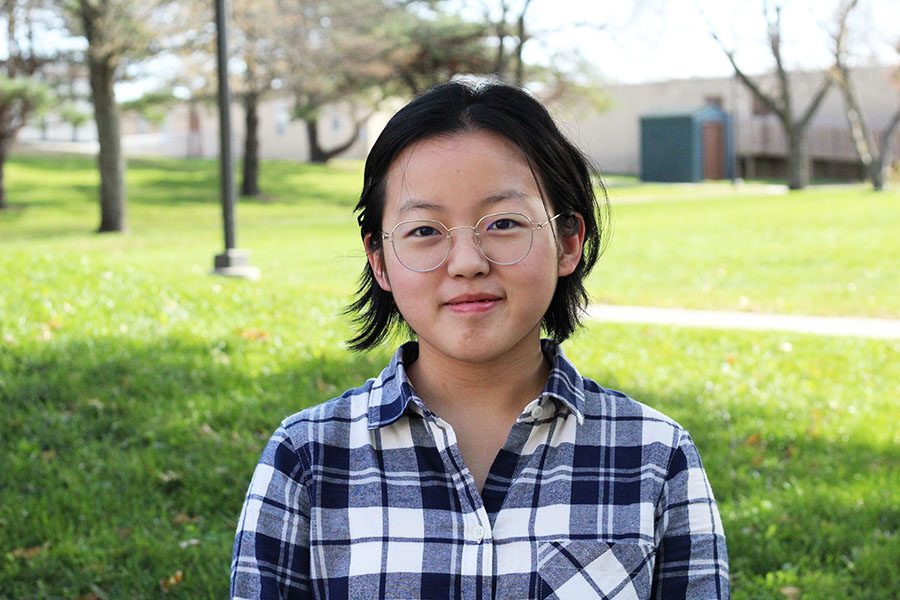Joy at West
Junior Zheyi Li shares the differences in the Chinese and American education system that she’s noticed during her visit at West.
Joy Li ’20 smiles for a photo. She will be attending West for only a month before returning to China.
Zheyi Li ’20 is walking through the same halls, going to the same classes and talking to the same teachers as many West students. While the day to day life in the Iowa City Community School District has become mundane for most of her peers, this is a new experience for Li, one that will end when she returns to China in November.
Li, or Joy, as she is known by her classmates here, normally attends Chengdu Experimental Foreign Languages School, a boarding school in Chengdu, Sichuan, China. Li arrived in Iowa on Oct. 10. Her mother is currently studying at the University of Iowa and she wanted Li to come along so she could observe different kinds of schooling.
“Here you have clubs, you have social activity, you can get a part-time job and you talk to different people and you walk to different classrooms,” said Li. “In China when you study, you buy a lot of books [and] you do a lot of homework. The teacher … prepares everything for you. You just have to sit and do the problem, solve the problem and try to get a better score. It’s like being a robot.”
At her boarding school, Li has five classes in the morning, four in the afternoon and four in the evening.
Li has enjoyed the smaller classroom setting in Iowa. In her classes in China there are at least 50 students in a room, so students cannot always get questions answered about confusing topics and they do not build as many personal connections with their teachers.
At West, Li has gotten to know Gary Neuzil, her psychology and government teacher.
“I think it’s amazing when you have a student of this caliber who can come in and accept our culture and also accept my unique teaching styles,” Neuzil said.
She has been surprised by the responsibilities students have, such as holding a job or driving because in China the driving age is 18. One day Li was walking home and one of her classmates drove by and greeted her. She was surprised to see them behind the wheel.
Li noticed that students here have more time to explore their interests.
“I think the students in America are much more mature than us. We know only how to study, but we don’t know anything else. I’m not going to say everyone, but most students,” Li said. “I don’t know anything about my hobbies.”
With the free time she has gotten on her visit, Li was able to try ice skating at the Coral Ridge Mall. She had seen ice skating in the Olympics and thought it looked beautiful.
“In China I haven’t got the time even to try it,” said Li. “I stay in school from Sunday evening to Saturday evening, my weekend is only one day, I have to do my homework and there’s not much spare time for me; but now I get to enjoy it.”
There are a few clubs at her school, and Li is involved with the Model UN. However, Chinese students don’t have much time to participate in extracurriculars, and 12th graders can’t be in clubs because Gāo Kǎo is right around the corner.
Gāo Kǎo is a high stakes test that determines what kind of college high school graduates will attend.
“The final test you can only take once,” said Li. “So I think that’s sometimes unfair because what if you get sick?”
The pressure is a lot for students to handle. Li said, “It’s something to be ashamed of,” if students don’t perform well on the test.
Li noted that in the United States the scores on tests aren’t the only factors colleges value; athletics, musical ability and involvement in extracurriculars are also taken into account, while in China, the test score is the most valued and all of high school is spent preparing for it.
“If I have an apple and a pear in my hands and my apple got picked away I still have a pear. But China says I’ve only got my apple. Well, if somebody took it away then I would think, ‘Oh my God, my whole life’s ruined,’” Li said.
When she leaves on Nov. 8, Li is going to miss the opportunity to express individualism that is present at West. Student here have few limits on their clothes and the way they present themselves. At Li’s school there is less opportunity for her to express herself, and physical aspects like hairstyles have rules.
“Everyone is different. Everyone has their own special thing. But in China everyone is like the same,” Li said.
While being in Iowa has shown Li what American public schools are like, her presence in class has also taught her peers about the Chinese culture.
“She truly brings a boost of energy, but also she’s been able to contribute contents of her own culture, her own society and particularly talking about what student life is [like] in China,” Neuzil said.
Your donation will support the student journalists of West High School. Your contribution will allow us to purchase Scholarship Yearbooks, newsroom equipment and cover our annual website hosting costs.

Natalie Dunlap is a senior and the Online Editor-in-Chief for the West Side Story. She is also involved in theatre and West High Democrats. When she's...



